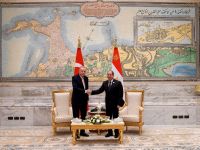NATO-member Turkey on Saturday, September 22, said it would open its air space and airports to US transport planes as Washington gears up for an eventual strike in the aftermath of last week's terrorist attacks.
Turkish Prime Minister Bulent Ecevit gave the permission to US President George W. Bush in a letter dated September 21, Ecevit's office said in a written statement. "The prime minister has written that the Turkish government will meet a US request for US transport planes to use Turkish air space and Turkish airports if necessary," the statement said.
The statement did not specify whether the planes in question were military aircraft, but Turkish air space has been open to civilian traffic for years and the country is already host to a number of US military planes. Speaking to reporters late Friday outside his office, Ecevit said that it was natural for the United States to "take fly-over permission from Turkey and use Turkey for refueling."
The announcement constitutes Turkey's first concrete commitment to an international alliance to punish the culprits of the September 11 attacks in which thousands died when hijackers rammed three planes into New York's World Trade Center and the Pentagon. The prime suspect of the attacks is Saudi millionaire Usama Bin Ladin who has found refuge on Afghan soil ruled by the hardline Taliban militia.
The Turkish statement added that it would be beneficial for Turkey and the United States to exchange intelligence and cooperate regarding developments in northern Afghanistan, which is controlled by the Northern Alliance, the opposition to the ruling Taliban.
"Turkey will increase its equipment, training and other aid it has been giving to the Northern Alliance," it said. Ecevit said Friday that Turkey, which has the second largest army in NATO after the United States, was ready to give military training to the Afghan opposition. It also signaled that Ankara could supply Washington with intelligence on Afghanistan.
"Turkey has had for years extensive intelligence regarding the region, the prime minister said. Turkey has maintained close relations with key anti-Taliban commander Abdul Rashid Dostam, who had been in control of northern Afghanistan before the Taliban chased him out in 1998.
Asked whether Turkey would give military support to the United States, Ecevit said that there had been no such demand from Washington. "However, we might contribute to the (military) build-up the US has been carrying out and will carry out in the region. We will discuss the details if necessary," he added.
Turkey on Friday called on the United States to exercise utmost caution in an eventual attack against the Taliban.
Israel has also agreed to let the United States use its airspace for an anti-terrorist operation, the Israeli ambassador in Washington said in an interview published Friday, September 21. "Israel offers the United States all the help deemed necessary, including the use of the Israeli airspace," David Ivri told the daily Yediot Aharonot.
He said Israel would be warned sufficiently in advance by the United States if an attack were to be launched. "The United States will warn us before launching an attack," said the ambassador, a former chief of the Israeli air force.
However, Ivri said Washington "will not attempt to bring us into a military campaign ... giving the impression the United States are undertaking a war against a Muslim country with Israel's help."
According to press reports, during the 1991 Gulf war, Israel had been warned early a few hours in advance of the US attack against Iraq. Iraq retaliated by firing 39 SCUD missiles with conventional warheads against Israel, killing two people and injuring hundreds, and causing serious material damage.
Israel had been preparing for a chemical warhead missile attack and had distributed gas masks to the population. Over the past few days, Israel has started handing out masks again in the wake of the September 11 US terror attacks, in case Iraq becomes a target of Washington's anti-terrorist campaign.
US President George W. Bush called Thursday night on the United States and the rest of the world to win the war against terrorism, by resorting to any means, including military ones.
The Iranian government said Thursday, September 20, it would refuse to allow the United States to use its airspace for any attack on neighboring Afghanistan. "The Islamic Republic of Iran will in no way allow the United States to attack Afghanistan using its airspace," said foreign ministry spokesman Hamid-Reza Assefi, quoted on state television.
Iran's supreme leader Ayatollah Ali Khamenei said Monday that Tehran, whose ties with Washington were severed two decades ago, "condemns any eventual military action in Afghanistan which would lead to a new human catastrophe."
Iran, home to more than one million Afghan refugees, is also concerned over a possible influx of refugees in case of US military strikes on Afghanistan in retaliation for last week's terror attacks in the United States. ― (AFP, Ankara, Jerusalem, Tehran)
© Agence France Presse 2001
© 2001 Mena Report (www.menareport.com)







